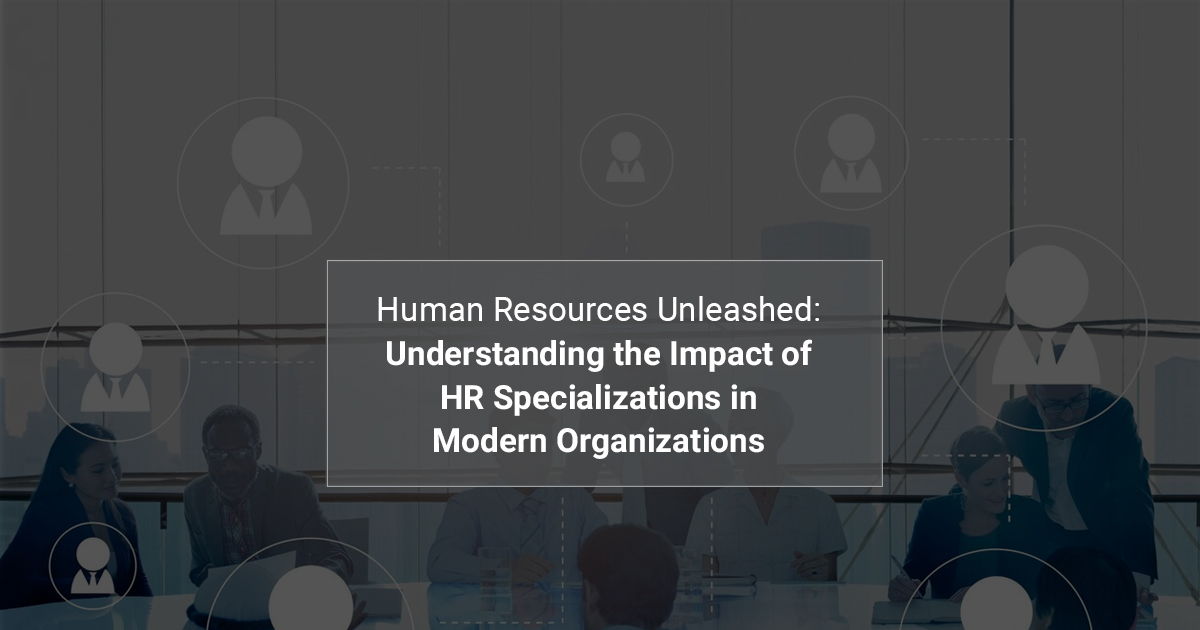Human Resources Unleashed: Understanding the Impact of HR Specializations in Modern Organizations
12 Sep 2024

Human resources is a centralized department in an organization that ensures employees are recruited, onboarded, trained, and compensated. In the contemporary business landscape, the role of HR goes beyond recruitment and compensation. Evolved to be strategic partners to stakeholders, HR personnel are shaping the future of an organization.
The role transformation of human resource management brings in the multi-faceted role they hold in global and modern organizations. Policymakers, strategic thinkers, retaining and replacing talent, budgeting, and more have revamped the traditional role they hold within companies. Let us take a closer look at how MBA human resources impact they bring to a company making a great work culture and contemporary models of success.
Impact of HR in Modern Organizations
Strategic Planning and Company Alignment
Aligning the workforce to company policies and culture is the onboarding process by HR in an organization. Being a bridge between the employees and the senior leadership enables HR to draw a map of business strategy and growth. Attracting the right mix of talent into the company is their focus and primary job role, HR also ensures that they plan succession, training, human capital strategies and more. Specializing in strategic planning for an organization can be challenging, but responding effectively to crises and seizing opportunities by studying the market conditions enables organization agility and workforce retention.
Talent Acquisition and Management
Cut-throat competition is an accurate description of the present market conditions within organizations. It is the HR that enables companies to recruit the talent that suits roles within budget. From conducting interviews, screening candidates, salary negotiations, and retaining vital resources in the organization, it is the experience, and the right MBA human resources that supports in understanding the landscape.
The impact of HR goes beyond ensuring a positive workplace culture. It goes beyond to elevate efficiency, productivity, employee assessments, and securing talent that matters to the project and the organization. It is their commitment to excellence that sustains success in the fierce marketplace of talent acquisition.
Compliance and Legal Oversight
Employment laws are changing every day. Keeping up with the legal compliance can be a challenge a HR faces daily. Staying abreast with legislative changes, mitigating legal risks, and employee relations are the job descriptions that human resource management signs up when they join an organization. Ethical standards, diversification, labour laws, penalties, damage control entail this specialization.
Steering through regulatory complexities can be time-consuming and on tight schedules. But, with an MBA in HR, you are well-trained to begin your job on the first day. Open opportunities via internships, workshops, and guest lectures, one can ensure to handle situations with crisis like a pro.
Conflict Resolution and Communication Map
Human resource management ensures you work in conflict resolution and communication between employees. Be it between senior leadership and employees, or between verticals in the department, HR is a mediator who maps the communication flow and resolves issues before it sours up to be a legal conflict.
The impact of HR lies truly within this scope as they facilitate a platform of discussion and grievance redressal. Their pivotal role and specialization in being empathetic and mediator enables HR to nurture a healthy workplace environment where communication is open to boost morale and address issues impartially.
Employee Performance Management, Development, and Training
MBA in HR with the right internship and experience supports you in ensuring that employees are up-to-date on various skill sets required for the position. By taking the lead in the initiative, HR identifies skill gaps, maps out training programs, and implements performance appraisal systems to compensate the employee. By devising upskilling programs and a road map to reach the goal, HR ensures that employees are well-equipped for challenges and have the requisite skills to adapt to changing roles.
MBA in HR and 10 Models that Can Help Succeed
The role of HR is an ever-evolving landscape of work. The specialization a HR holds after an MBA human resources comes with experience and the challenges one faces in a company. Their significance and contributions to the human resource department can be identified by the model they choose to abide by in an institution.
Some models commonly chosen by human resource management are -
- The People Value Chain Model
- The Dave Ulrich HR Model
- The Harvard Framework of HRM
- The ASTD Competency Model
- The Warwick Model
- The Standard Casual Model
- The Advanced HR Value Chain
- The 8 Box Model by Paul Boselie
- The 5Ps Model
- The High-Impact HR Operating Model
Can JAIN (Deemed-to-be University) Support You with MBA in HR?
JAIN (Deemed-to-be University) - CMS B School understands your concern regarding an MBA and the specialization you require for your professional goals. With human resource management as one of the specializations in MBA, you can rest assured that you are well-trained via internships and industry talks. While you prepare to take over the world, our faculty brings in alumni to help you decide on a career path that suits your dreams and aspirations.
Strengthen your foundations across the business spectrum with our experienced faculty members at the Faculty of Management Studies - CMS Business School. Be trained on all the models of HRM and excel beyond academics with our programs that help you step up in all facets of life. Contribute to organizations and grow to be a critical resource who thrives in dynamic environments.
Recent Blogs
06 Jan 2025
13 Jan 2025
20 Jan 2025